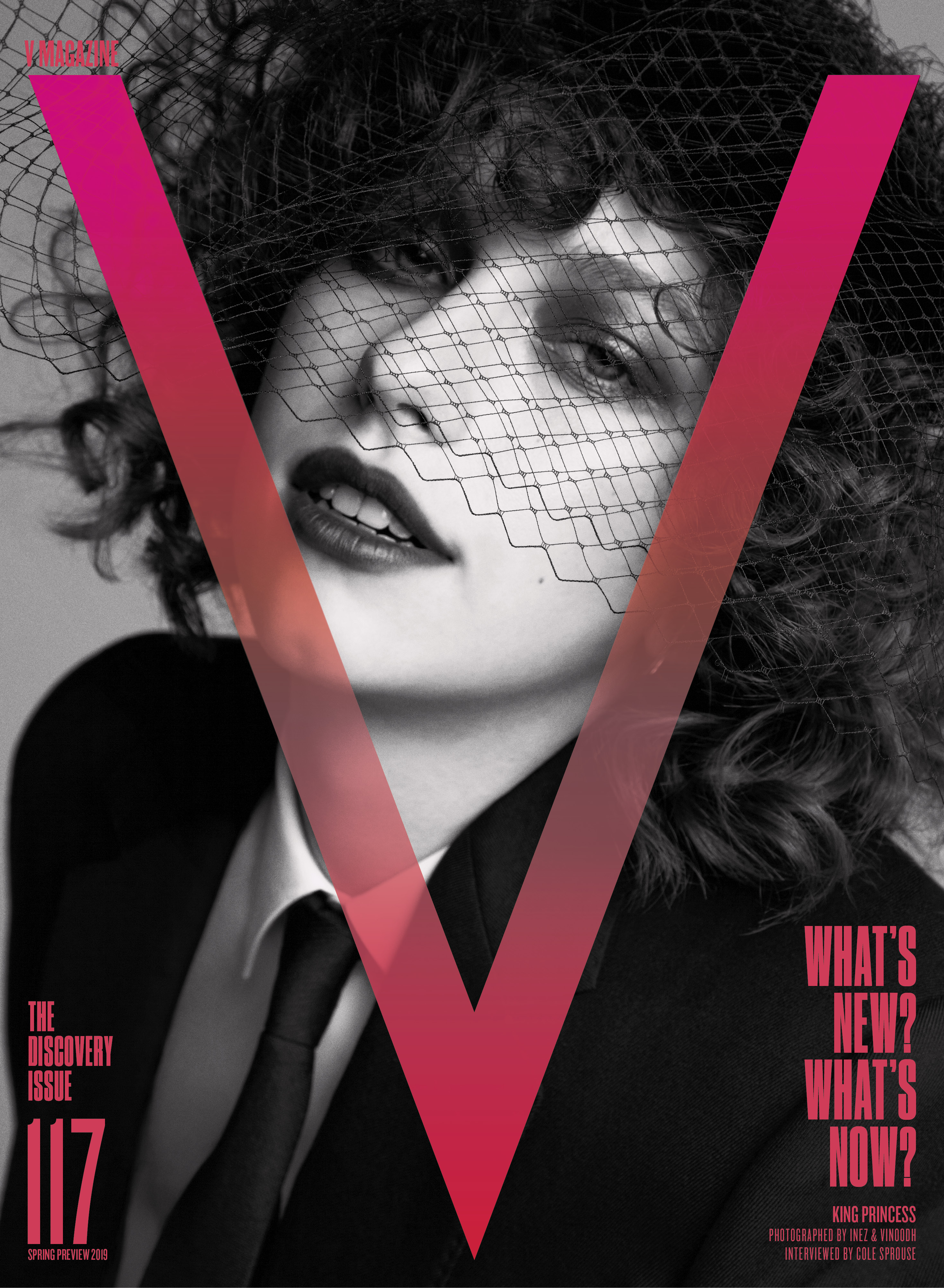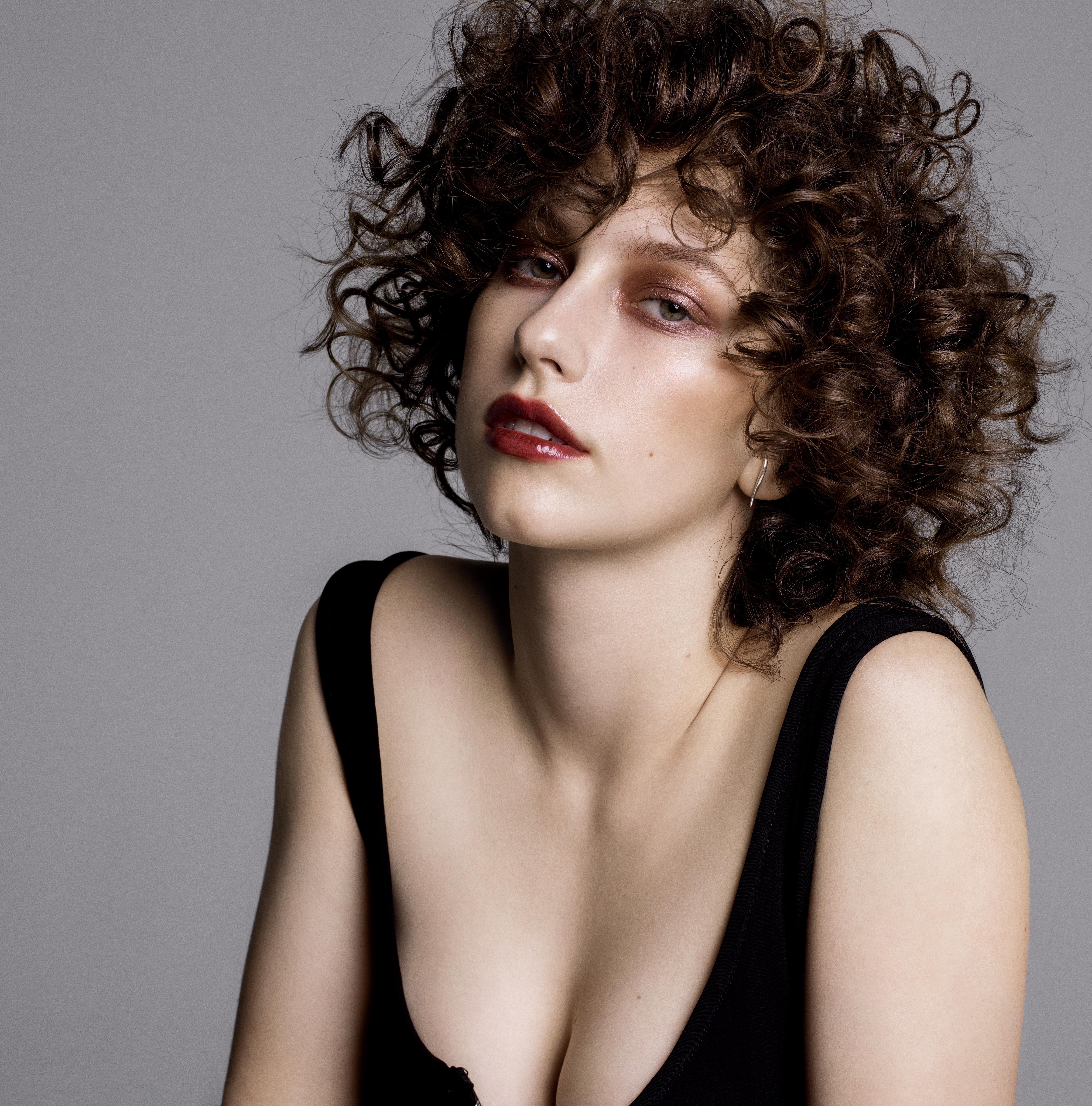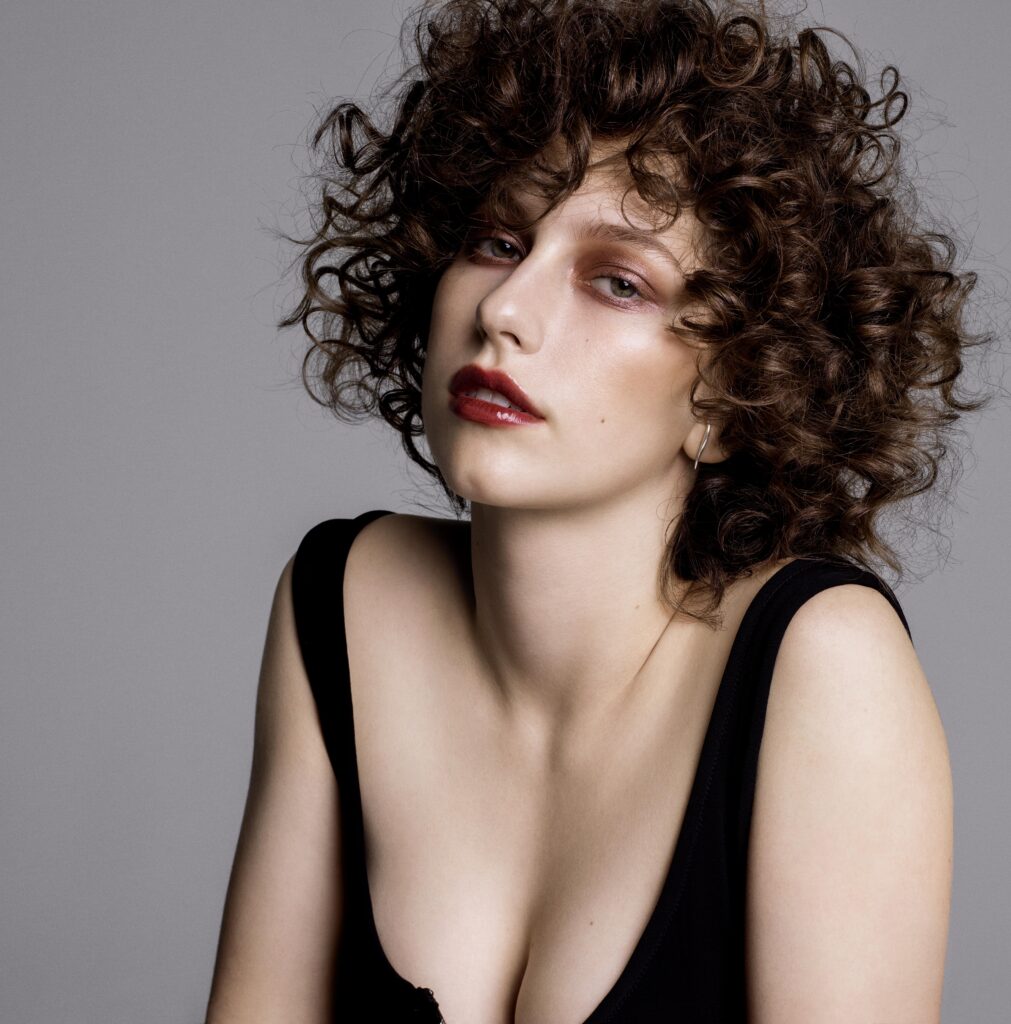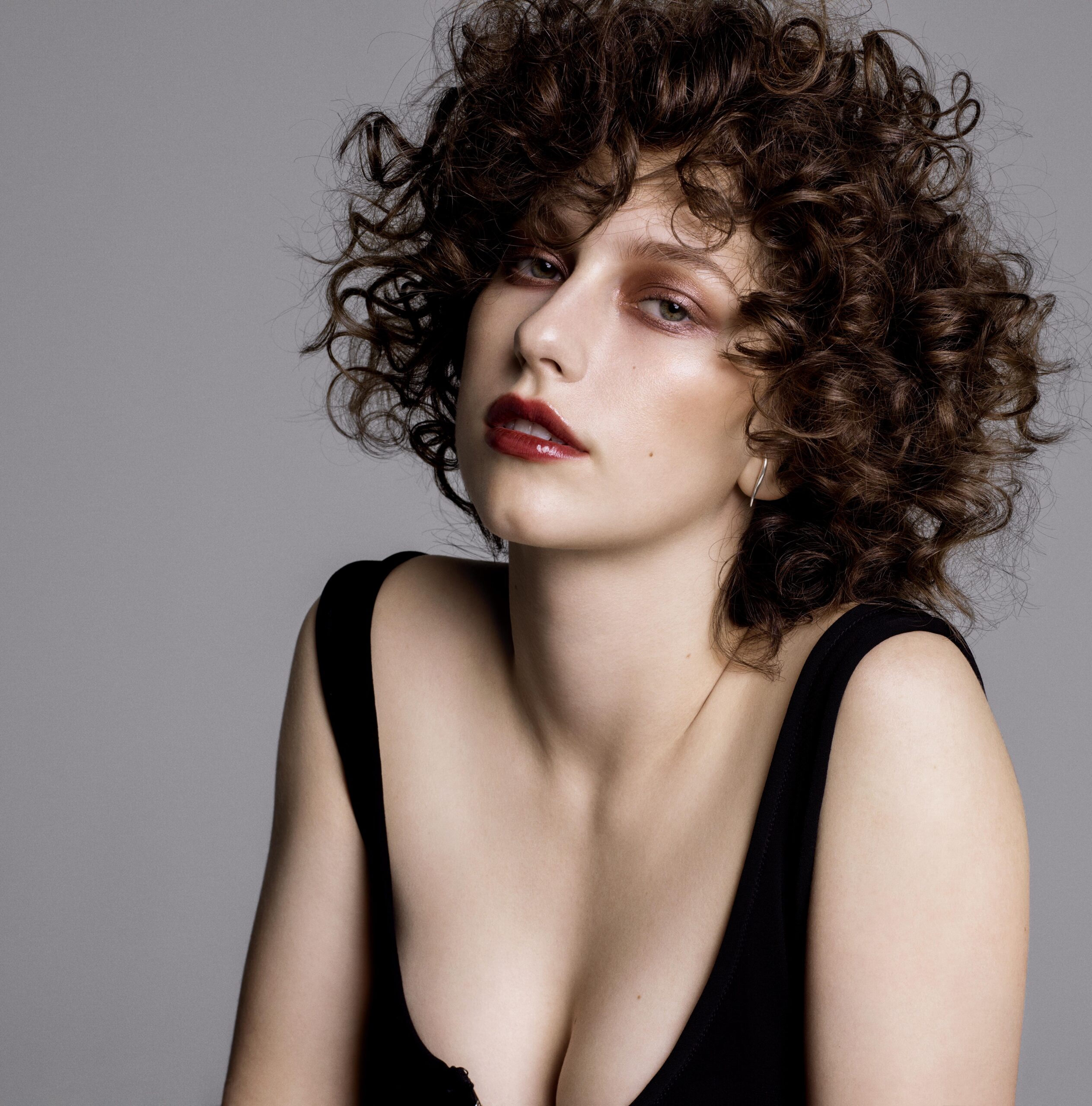
New York native Mikaela Straus, better known as King Princess, is a mix of cynicism and confidence. She, like many fellow Brooklynites, tactfully weaponizes this temperament: In conversation, her staccato, impassioned cadence could convince even the most stubborn listener that she is in the right—a talent she attributes to the sense of undiagnosed A.D.D. that many of us in her generation arguably share. Practically raised in the recording studio, she has an undeniable presence, and it’s no wonder that her short time in music has been marked by meteoric success—not to mention, a refreshingly queer-centric pop perspective.
I first met Mikaela at the Chateau Marmont, amid a riptide of Saturday-night-in-Hollywood clichés. We became fast friends. On a recent phone call, we discussed everything from the connection between sadness and creativity to that one time we joined in a bar fight (for the record, she has no regrets). We also talked about details and emotions we both felt best to keep off the record; as Mikaela notes, the industry can breed cynicism and loneliness, but with that comes a great bullshit-radar, and we both know to keep the honest ones close. Perhaps it’s this mutual honesty that drew us together in the first place. Perhaps it’s the A.D.D. Or maybe it’s best not to question camaraderie when it arrives. COLE SPROUSE
CS Since we’ve met, we’ve got along very well.
King Princess No, [we are] fully brothers. We got in a bar fight the first time we truly went out together. I was just as enthusiastic about [it] as you. I was going for it.
CS I read that you started in the arts quite young as well, and around 11, you went in to sign with a label?
KP When I was 11, I was singing background vocals in my dad’s studio a lot. I was surrounded by musicians and talented people who included me in their art-making. Sometimes they weren’t talented and that’s also why I was included. Which is funny because I was 11, in my pajamas, smoking a cigarette.
CS “TAG ME IN!”
KP “WHEN’S MY TIME?” I was fully an old Jewish lady. No, but I was around all of this music, and soon I was taking all these little jobs for my dad. It was cute, not exploitative. And soon I ended up [meeting] with labels. I was asked to be the voice of an animated character. But then Virgin Records dissolved so it never really went through. I’m glad because it was more about turning me into a kind of child singer.
CS Do you find that the pursuit of success interferes with your social and love lives?
KP It affects your relationships 100 percent. I feel like when it started popping off for me, I was insufferable to be around. The fact that people were watching me [made me] so anxious, nervous, and insecure. I balanced myself out after a couple months, but had to relearn that people don’t want to hear about work all the time.
CS Perhaps it’s because I was raised within the industry from such a young age but I oftentimes don’t know how to turn it off. And then there’s this other side of me that yearns for comfortable domesticity. Do you ever feel that?

KP I feel that way a lot. When I moved to L.A., I hated the city, but I also met some of the best people in my entire life. When I’m away from them, I long for that type of domesticity, where I’m at home with my people. But I also feed off sadness more than I do any other emotion in music. That’s been hard for me to cope with; that my work is also my friends and my love. And I can’t do it without them, but I also don’t want them to be a catalyst for my sadness.
CS Do you cultivate sadness in order to write?
KP I didn’t try very hard in college, but one thing I did learn was from someone who came in to speak about songwriting; she was talking about the greatest loss of her entire life, which she said gave her inspiration for 30 years. Then she met that person again later in life and basically realized they fuckin’ sucked. So she had to go find new inspiration.
I feel that same way; your mind becomes an emotional bank, and that’s how I write music, but the process of getting there is true pain. And I don’t want that pain to ever leave me because it gives me purpose and empathy. I want to feel things. If happy means I don’t get to make music, fuck that.
CS It’s a conflicting thing. Because all of us, to some degree, are chasing a mental or physical wellbeing, but I oftentimes think that, especially for workaholics, that with success we end up losing sight of the very thing that made success a reality in the first place.
KP Did you ever feel like… I feel like this a lot: When I started receiving the gratification of success in my music—gratification through interviews or magazines, or whatever—I started to lose something I had when I was a kid.
CS Sure.
KP I [used to] sit in my room and daydream about the things that I wanted—these goals I had in my life. And sometimes you get those things that you had been dreaming about forever, you just go “what the fuck do I even do with this?” I’ve spent so long hoping for this, and now I’m privileged with having it, so what’s next? Is it about getting to a next level? Or is it about being honest? That’s what I struggle with a lot. If I decide in like five years to make a really weird record, it may not do great, but [at least] I would [know that] the daydream is still present.
CS [Given] how long I’ve been working, I think about my goals quite a bit, and what happens when I achieve them. Do you have an end goal or a list of goals?
KP I mean, ideally, I would love to become a big ol’ gay pop-star, kind of like Freddie Mercury. But as far as my happiness, I really just want to make art with my friends forever. The careers that we’re in are lonely. They’re lonely and can be empty.
To be quite honest, I think what I long for the most is just friendship and community. I had this moment recently when I shot my last video. I thought, “What could be better than this? What could be better than all of my friends in a room, with a green screen, fucking around for six hours?” I don’t think I have the answers for a lot of shit, but I do know that I can’t lose that part of myself.
CS Certainly.
KP The careers that we’re in are lonely. They’re lonely and can be empty. I don’t want to be an empty person. I see so many people that are famous and successful or however you quantify those things, but they don’t have love or people. And that scares me more than anything. Do you ever feel like that?
CS Of course. I mean, I have an identical twin, which I think helped, for many years, with the loneliness that’s coupled with young stardom and the success that blinds people in that position. How do you define your community?
KP I have to credit the gay community and the people that came before me. I think, for me at least, growing up and not having hardly any gay material at school meant I would personally find television, movies, articles, and documentaries that were evocative of those themes I was searching for in class. Having that well of knowledge was super helpful.
Gay has always been cool; it’s always been what people want, but it’s not been labeled or credited. Pop stars have always loved gay culture, gay male culture specifically. I think paying homage and highlighting parts of history that you’re touching on are the most solid ways to be relevant.
I also surrounded myself with friends that encouraged a sound from me that was different—even if that differed from the authorities on relevance in the industry: old white men.
CS Well said.
Discover More



